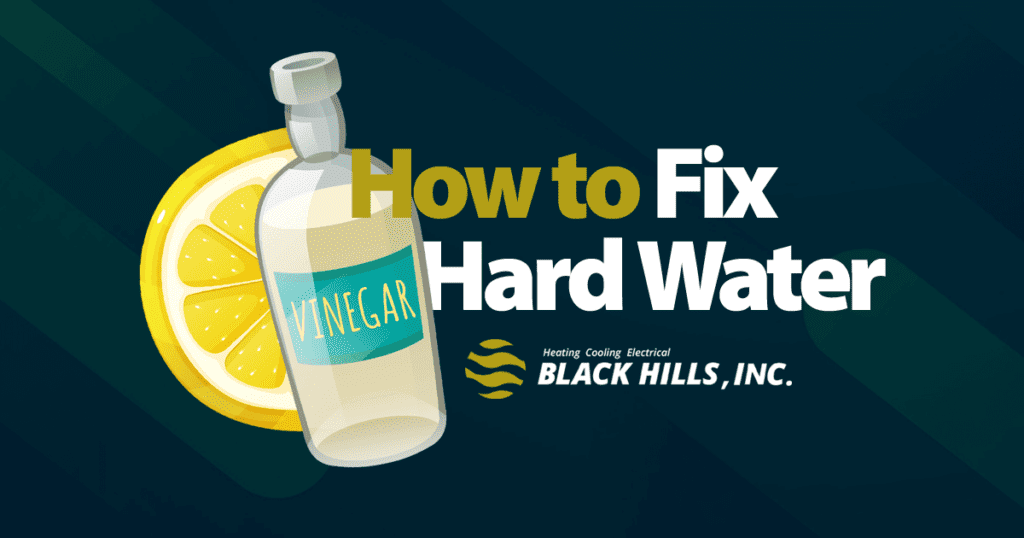Hard water is a common issue that many households face. It contains high levels of minerals such as calcium and magnesium, which can make cleaning more difficult and reduce the lifespan of your appliances.
If you believe that hard water is causing problems in your home, it could be the right time to start learning how to counteract the negative effects of hard water with trusted solutions from professional plumbers.
For homeowners in the Olympia, Washington, area, Black Hills is here to help you identify whether or not you have hard water, as well as provide solutions for the issues that hard water can cause.
What is Hard Water?
Before we delve into the solutions, let’s understand what hard water is and how it affects your daily life.
Hard water is characterized by its high mineral content, primarily calcium and magnesium. When hard water is heated or evaporates, it leaves behind mineral deposits, commonly known as limescale. It can also interact with soap, leaving behind “soapscum.” These mineral deposits can clog pipes, reduce water flow, and damage appliances over time.
It is estimated that nearly 85 percent of water in the United States is considered hard. In fact, there are very few places that have naturally occurring soft water in the States, including New England, the Pacific Northwest, the Gulf states, and parts of the Southeastern region.
You can test to determine whether you have hard water or not, which can help you decide whether or not you need to find a solution for hard water. The easiest way to determine if your water is hard is to higher a professional company to test the water for you. However, if you are looking for a more DIY solution, you can look for a crusty scale on faucets, use a water hardness testing kit, or review your local water testing report.
Problems with Hard Water
Households with hard water may quickly notice some plumbing and appliance problems. For example, hard water can contribute to clogged drains, mineral buildup on faucets, and decreased water flow. Often, hard water will lead to more frequent plumbing repairs.
With hard water, you are likely to see soap scum and mineral residue in your showers and tubs. Your sinks, tubs, and toilets may also be stained. Scale deposits will pop up on appliances and pipes. In some cases, the hard water issues become so bad that appliances like water heaters and refrigerators fail.
Hard water can also have negative effects on your body. The high levels of minerals in your water could lead to irritated skin, dry skin, dull hair, and dry hair.
When you wash your clothes and dishes with hard water, you are likely to notice a few annoyances, such as:
- Spotty dishes
- Worn out clothes
- Rough, stiff clothes
- Dingy clothes
How to Fix Water Hardness
Below are the best methods to fix water hardness. With these tips, you should find effective solutions for dealing with hard water in your house.
1. Water Softeners
Installing a whole-home water softener is the most effective way to fix hard water. These systems remove the minerals responsible for water hardness and replace them with sodium or potassium ions. Water softeners provide numerous benefits, including reduced limescale buildup, softer skin and hair, and improved appliance lifespan.
2. Chemical Water Softeners
Chemical water softeners are another option for fixing hard water. These products contain chemicals that bind to the minerals, preventing them from causing limescale buildup. However, it’s important to note that chemical water softeners are temporary solutions and require frequent application.
3. Magnetic Water Conditioners
Magnetic water conditioners are devices that use magnetic fields to alter the structure of minerals in hard water. While some users claim positive results, the scientific community still debates the effectiveness of magnetic water conditioners.
Fixing Hard Water Damage in the House
After hard water wreaks havoc on your home, you are going to be left cleaning up the mess it left in its wake. Here are a few tips for getting rid of the effects of hard water in your home.
Descaling Appliances
Regular descaling is essential to remove limescale buildup in appliances and fixtures such as dishwashers, washing machines, kettles, coffee makers, and showerheads. Use a descaling solution or a mixture of vinegar and water to dissolve the mineral deposits. Follow the manufacturer’s instructions for each appliance to ensure safe and effective descaling.
Cleaning Hard Water Stains
Hard water can leave unsightly mineral stains on fixtures, sinks, and glass surfaces. To clean these stains, mix equal parts vinegar and water, and apply the solution to the affected areas. Scrub gently with a sponge or cloth, then rinse thoroughly. For stubborn stains, you can use a commercial limescale remover.
Is Hard Water Bad for Fish or the Environment?
Hard water can adversely affect fish and aquatic life, especially those requiring specific water conditions. Some fish species are more sensitive to changes in water hardness and pH levels, which hard water can directly impact.
Hard water works to stabilize the pH of bodies of water. In most cases, harder water contains a lower level of metal toxicity, making it better for fish and other aquatic animals.
It’s crucial to research the water requirements of your fish species and ensure they are compatible with the hardness of your water. If necessary, consider using a water conditioner or a reverse osmosis system to provide optimal living conditions for your aquatic pets.
Black Hills Whole-Home Water Softener Installation & Repair Services
Dealing with hard water doesn’t have to be a daunting task. By implementing the solutions mentioned in this guide, you can effectively fix water hardness and minimize the negative effects of hard water in your home.
Black Hills’
licensed plumbers provide expert whole-home water softener installation services in Olympia and Thurston County, Washington. A water softening system will handle hard water and remove the calcium and magnesium from it, making cleaning and descaling your appliances effortless.
After installing the water softener, you’ll want to let your fixtures run water to clean out your plumbing and help start descaling your fixtures and appliances. The soft water will pick up the mineral deposits and chip away at them over time. Most of it will dissolve in the first 30 days, but a complete descaling process may take as long as 90 days after installation.
Contact Black Hills to get your water tested for hardness and learn more about the benefits of installing a whole-home water softening system.

